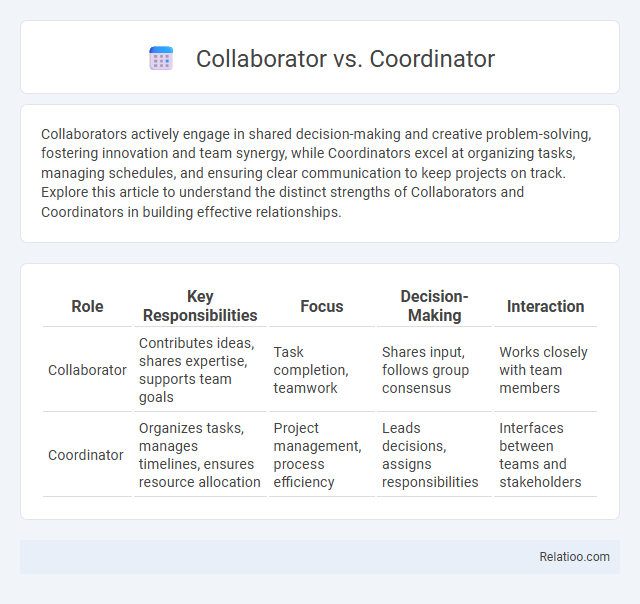Collaborators actively engage in shared decision-making and creative problem-solving, fostering innovation and team synergy, while Coordinators excel at organizing tasks, managing schedules, and ensuring clear communication to keep projects on track. Explore this article to understand the distinct strengths of Collaborators and Coordinators in building effective relationships.
Table of Comparison
| Role | Key Responsibilities | Focus | Decision-Making | Interaction |
|---|---|---|---|---|
| Collaborator | Contributes ideas, shares expertise, supports team goals | Task completion, teamwork | Shares input, follows group consensus | Works closely with team members |
| Coordinator | Organizes tasks, manages timelines, ensures resource allocation | Project management, process efficiency | Leads decisions, assigns responsibilities | Interfaces between teams and stakeholders |
Understanding the Roles: Collaborator vs Coordinator
Collaborators actively engage in joint efforts to achieve common goals, often contributing ideas and expertise without overseeing the project's management. Coordinators focus on organizing tasks, managing schedules, and ensuring that team activities align smoothly to meet deadlines and objectives. Understanding the distinct responsibilities helps optimize teamwork by balancing creative input with effective project oversight.
Key Responsibilities of a Collaborator
A Collaborator primarily focuses on actively contributing ideas, sharing knowledge, and working jointly with team members to achieve common goals. Their key responsibilities include communicating effectively, supporting team efforts, and integrating diverse perspectives to enhance project outcomes. Collaborators foster cooperation by building trust, resolving conflicts, and ensuring alignment with shared objectives.
Core Functions of a Coordinator
A Coordinator primarily manages schedules, resources, and communication to ensure smooth project execution and team collaboration. Your role involves organizing tasks, tracking progress, and facilitating information flow between collaborators and stakeholders. Core functions include planning meetings, aligning objectives, and resolving logistical challenges to maintain project efficiency.
Skills Required for Effective Collaboration
Effective collaboration requires strong communication, adaptability, and conflict resolution skills to ensure all team members contribute meaningfully. Coordinators need organization, time management, and delegation abilities to align tasks and maintain project flow. Your success depends on developing emotional intelligence, active listening, and problem-solving skills to bridge differences between collaborators and coordinators.
Essential Qualities of a Successful Coordinator
A successful coordinator excels in organizational skills, effective communication, and the ability to manage multiple tasks efficiently to ensure seamless project execution. Unlike collaborators who contribute ideas and coordinators who orchestrate logistics, leaders guide the team's vision and motivate performance. Essential qualities of a coordinator include attention to detail, problem-solving abilities, and adaptability to dynamic environments.
Collaboration vs Coordination: Key Differences
Collaboration involves multiple individuals working together creatively to achieve a common goal, emphasizing shared responsibility and idea exchange. Coordination focuses on organizing tasks and resources efficiently to ensure smooth execution and avoid overlaps, often managed by a coordinator. Your team benefits most when collaboration fosters innovation while coordination maintains structure and clarity in project workflows.
When to Choose a Collaborator Over a Coordinator
Choose a collaborator over a coordinator when the project requires deep expertise, active contribution, and shared responsibility for outcomes rather than just task management. Collaborators bring specialized skills and engage in decision-making processes, making them ideal for complex problem-solving and creative initiatives. Coordinators focus on organizing activities and communication flow, so opt for collaborators when innovation and hands-on involvement are critical.
The Importance of Communication in Both Roles
Effective communication is crucial for both collaborators and coordinators to ensure seamless teamwork and project success. Collaborators rely on clear, open exchanges of ideas to contribute creatively and collectively solve problems, while coordinators must communicate directives and progress updates efficiently to manage tasks and align team efforts. Mastering communication in these roles enhances coordination, reduces misunderstandings, and drives productivity across collaborative environments.
Impact on Team Dynamics: Collaborators and Coordinators
Collaborators foster open communication and innovation by encouraging diverse perspectives, which enhances team creativity and problem-solving capabilities. Coordinators streamline team efforts by organizing tasks, clarifying roles, and ensuring alignment with shared goals, which improves efficiency and reduces conflicts. The combined impact of Collaborators and Coordinators balances creative input with structured execution, promoting a cohesive and high-performing team dynamic.
How to Balance Collaboration and Coordination for Success
Balancing collaboration and coordination requires aligning roles clearly by defining Collaborators as contributors generating ideas, Coordinators as organizers synchronizing tasks, and Leaders as decision-makers steering the vision. Effective frameworks leverage collaboration to foster creativity and diverse input while using coordination to manage timelines, resources, and dependencies. Utilizing project management tools and communication protocols enhances transparency, reduces overlap, and ensures all stakeholders contribute toward shared objectives efficiently.

Infographic: Collaborator vs Coordinator
 relatioo.com
relatioo.com